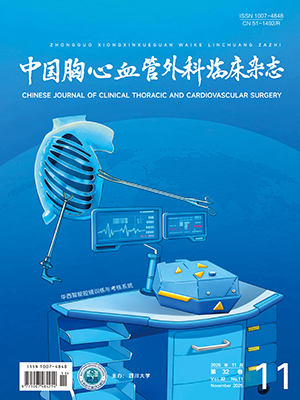| 1. |
Park HJ, Lee SY, Lee CS, et al. The Nuss procedure for pectus excavatum: evolution of techniques and early results on 322 patients. Ann Thorac Surg, 2004, 77(1): 289-295.
|
| 2. |
Hyun K, Park HJ. The cross-bar technique for pectus excavatum repair: a key element for remodeling of the entire chest wall. Eur J Pediatr Surg, 2023, 33(4): 310-318.
|
| 3. |
Park HJ, Rim G, Yoon SK. Recent advancements in pectus surgery: crane lifting, multiple-bar approach, bridge stabilization, and sandwich technique. J Pediatr Surg, 2024, 59(4): 640-647.
|
| 4. |
Ermerak NO, Yuksel M. Modification of the Nuss procedure: the crossed bar technique for new subtypes of pectus excavatum. Gen Thorac Cardiovasc Surg, 2023, 71(10): 577-583.
|
| 5. |
Nuss D, Obermeyer RJ, Kelly RE. Pectus excavatum from a pediatric surgeon's perspective. Ann Cardiothorac Surg, 2016, 5(5): 493-500.
|
| 6. |
Nuss D, Kelly RE. Indications and technique of Nuss procedure for pectus excavatum. Thorac Surg Clin, 2010, 20(4): 583-597.
|
| 7. |
Ersöz H, Karaali R, Kuzmichev V, et al. Evaluation of cross-bar and parallel-bar techniques in MIRPE surgery in different countries: a multicenter study. Updates Surg, 2024, 76(4): 1501-1509.
|
| 8. |
谢亮, 陈刚, 唐继鸣, 等. Nuss手术矫治复杂漏斗胸95例. 中华胸心血管外科杂志, 2011, 27(11): 648-650.Xie L, Chen G, Tang JM, et al. The Nuss procedure for complicated pectus excavatum. Chin J Thorac Cardiovasc Surg, 2011, 27(11): 648-650.
|
| 9. |
曾骐, 段贤伦, 张娜, 等. 大年龄组漏斗胸的微创Nuss手术. 中华胸心血管外科杂志, 2007, 23(3): 193-195.Zeng Q, Duan XL, Zhang N, et al. Nuss procedure for the correction of pectus excavatumin elder group. Chin J Thorac Cardiovasc Surg, 2007, 23(3): 193-195.
|
| 10. |
Kim MW, Jeong JY, Ha G, et al. Brachial plexus palsy after Nuss procedure for pectus excavatum. Turk Gogus Kalp Damar Cerrahisi Derg, 2019, 27(2): 245-247.
|
| 11. |
王磊, 胡丰庆, 王明松, 等. 漏斗胸的手术设计与新型改良Nuss手术. 中国胸心血管外科临床杂志, 2020, 27(8): 900-906.Wang L, Hu FQ, Wang MS, et al. Surgical design and novel modified Nuss procedure for pectus excavatum. Chin J Thorac Cardiovasc Surg, 2020, 27(8): 900-906.
|
| 12. |
Nuss D, Kelly RE, Croitoru DP, et al. A 10-year review of a minimally invasive technique for the correction of pectus excavatum. J Pediatr Surg, 1998, 33(4): 545-552.
|
| 13. |
Darlong LM. Single-centre Indian case series using X or cross bar for Nuss procedure in pectus excavatum. Indian J Thorac Cardiovasc Surg, 2020, 36(6): 643-648.
|
| 14. |
Pilegaard HK. Nuss technique in pectus excavatum: a mono-institutional experience. J Thorac Dis, 2015, 7(Suppl 2): S172-S176.
|
| 15. |
Park HJ. A technique for complex pectus excavatum repair: the cross-bar technique for grand canyon type deformity (Park classification). Ann Cardiothorac Surg, 2016, 5(5): 526-527.
|
| 16. |
曾骐, 陈诚豪. 对如何全面、安全、细致开展微创胸壁矫形手术的思考. 临床小儿外科杂志, 2023, 22(6): 501-505.Zeng Q, Chen CH. Mini-invasive repairing chest wall deformity comprehensively, safely and meticulously. J Clin Pediatr Surg, 2023, 22(6): 501-505.
|
| 17. |
Moon DH, Park CH, Moon MH, et al. The effectiveness of double-bar correction for pectus excavatum: a comparison between the parallel bar and cross-bar techniques. PLoS One, 2020, 15(9): e0238539.
|
| 18. |
陶绍霖, 康珀铭, 冯涌耕, 等. 胸腔镜辅助改良Nuss手术治疗儿童漏斗胸临床疗效的单中心回顾性分析. 中国胸心血管外科临床杂志, 2023, 30(6): 867-872.Tao SL, Kang PM, Feng YG, et al. Clinical efficacy of thoracoscopy-assisted modified Nuss procedure in children with pectus excavatum: a retrospective analysis in a single center. Chin J Clin Thorac Cardiovasc Surg, 2023, 30(6): 867-872.
|
| 19. |
Kelly RE, Obermeyer RJ, Goretsky MJ, et al. Recent modifications of the Nuss procedure: the pursuit of safety during the minimally invasive repair of pectus excavatum. Ann Surg, 2022, 275(2): e496-e502.
|
| 20. |
Kim H, Rim G, Park HJ. Technical advances in pectus bar stabilization in chest wall deformity surgery: 10-year trends and an appraisal with 1, 500 patients. J Chest Surg, 2023, 56(4): 229-237.
|




